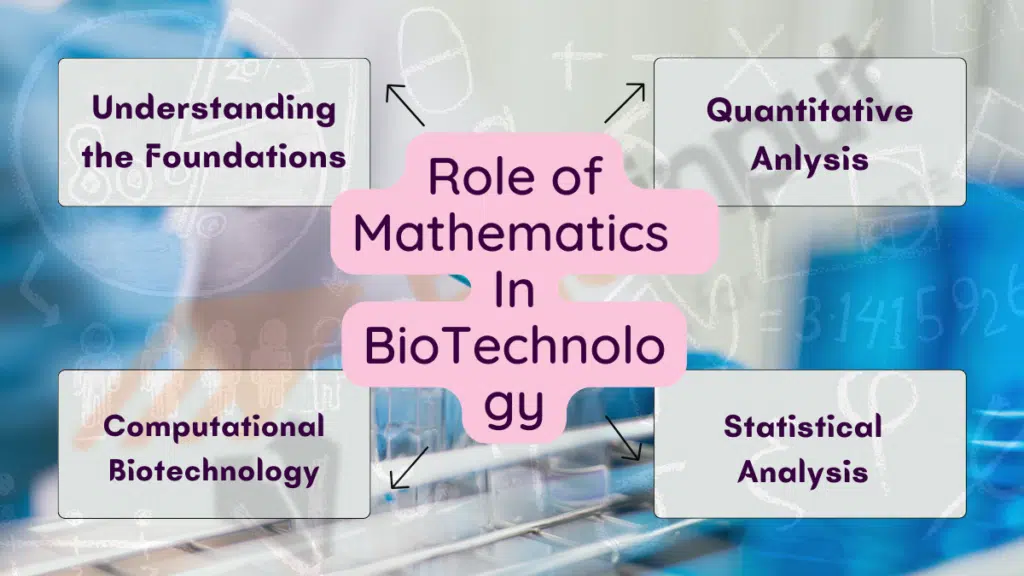Is Math Compulsory for Biotechnology?
In the world of higher education and specialized areas like biotechnology, many people wonder if you have to be good at math to study in biotechnology.
This question why math is compulsory for biotechnology important for students thinking about their future, their parents, and teachers too.
In this article, we will talk about Mathematics in Biotechnology.
Role of Mathematics in Biotechnology

Understanding the Foundations
Mathematics serves as the foundation for various scientific disciplines, including biotechnology.
It helps students develop critical thinking skills, problem-solving abilities, and a structured approach to analysis and experimentation.
Quantitative Analysis
In biotechnology, quantitative analysis is crucial. Students use mathematical tools to measure, analyze, and interpret biological data.
This skill is vital for experiments, research, and data-driven decision-making.
Computational Biology
Mathematics plays a pivotal role in computational biology, where complex algorithms and modeling are used to simulate biological processes.
This aids in drug discovery, genome sequencing, and disease modeling.
Statistical Analysis
Statistical methods are indispensable in biotechnological research.
They are employed to assess the significance of experimental results, validate hypotheses, and ensure the reliability of data.
Mathematics in the Biotechnology Curriculum

Core Courses
Most BTech programs include core courses in mathematics, covering topics such as calculus, statistics, and algebra.
These courses provide students with a solid mathematical foundation.
Customization Options
Some universities offer customization options, allowing students to choose math-related electives based on their interests and career goals.
This flexibility ensures that mathematics is relevant to their chosen specialization within biotechnology.
Research Requirements
For students pursuing research-oriented careers in biotechnology, a strong mathematical background is almost always mandatory. Research projects often involve data analysis, modeling, and simulations.
Industry Demands
The biotechnology industry highly values mathematical proficiency. Companies involved in drug development, genetic engineering, and bioinformatics seek candidates who can apply mathematical concepts to real-world problems.
Exceptions and Alternatives
Alternative Pathways
Mathematics in biotechnology is integral to some institutions offer alternative pathways for students who struggle with math.
These pathways may include additional support, bridging courses, or modified curricula.
Practical Experience
In certain cases, practical experience and hands-on skills partially compensate for a weaker mathematical background.
Such exceptions are rare, and most employers still prefer candidates with strong math skills.
Interdisciplinary Programs
Some universities offer interdisciplinary programs that blend biotechnology with other fields like computer science or business. These programs may have reduced mathematical requirements, making them suitable for students with math-related challenges.
Mathematics in biotechnology holds a significant place in the curriculum. It is a fundamental tool for understanding, researching, and excelling in this field.
As exceptions and alternative pathways exist, a solid mathematical foundation remains a valuable asset for aspiring biotechnologists.
FAQs
Is mathematics the same in all biotechnology programs?
Mathematics courses may vary slightly between institutions, but core concepts like calculus and statistics are generally consistent.
Can I pursue a in biotechnology if I’m not good at math?
While it’s challenging, it’s not impossible. Seek universities with support systems or consider interdisciplinary programs.
How does math benefit biotechnology research?
Math aids in data analysis, modeling, and simulations, crucial for advancements in biotechnology.
Are there specific careers in biotechnology that require less math?
Some roles emphasize practical skills, but math remains relevant in many aspects of biotechnology.



Leave a Reply